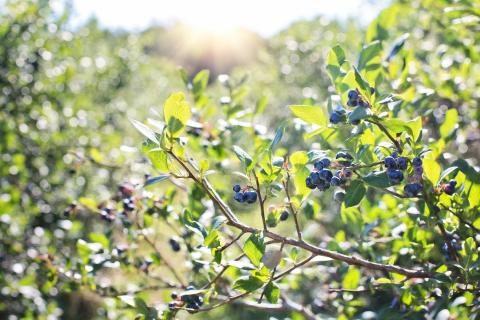New To Growing Blueberries

Highbush blueberries are an important native fruit crop in New Hampshire. In their natural habitat, highbush blueberries are usually found growing along wetland margins. Their fruit is enjoyed by many wildlife species, including, but not limited to, bears and many birds such as scarlet tanagers, thrushes, cedar waxwings and catbirds. Blueberries are also very ornamental with interesting twisted limbs and brilliant red fall color.
Blueberries grow best in well-drained soils that are high in organic matter. Sites that receive full-sun all day long promote maximum fruit production. Most importantly, blueberries need an acidic soil with a pH between 4.5 and 5.0 in order to grow well. If the soil pH is too high the leaves may yellow and the plants will likely fail to grow. Unaltered NH soils will often provide the necessary pH for blueberries, but it’s worthwhile to conduct a soil test to determine pH before planting. Soils with a pH above 5.0 can be amended by applying ground sulfur, but only apply at the rate recommended by a soil test.
Spring is a great time to plant young blueberry plants while soils are moist and temperatures are mild. Planting holes should be dug no less than twice as wide as the blueberry’s root ball. Incorporate a small amount of peat moss into backfill to increase soil organic matter. Cover the root zone with 3 to 4 inches of organic mulch such as wood chips, leaves, or pine needles to protect roots and help conserve soil moisture. Blueberries are extremely sensitive to drying out, so plants should be kept well-watered throughout the growing season, particularly during their first season as they become established.
To learn more about blueberry planting, care, and variety selection check out the Growing Fruit: Highbush Blueberries factsheet by Becky Sideman, UNH Extension Vegetable & Berry Specialist.
Got questions? The Ask UNH Extension Infoline offers practical help finding answers for your home, yard, and garden questions. Call toll free at 1-877-398-4769, Monday to Friday, 9 a.m. to 2 p.m., or e-mail us at answers@unh.edu.
